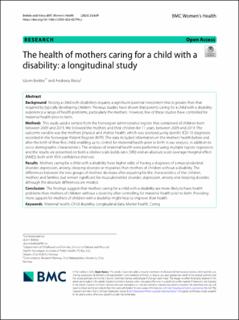| dc.description.abstract | Background Raising a child with disabilities requires a significant parental investment that is greater than that
required by typically developing children. Previous studies have shown that parents caring for a child with a disability
experience a range of health problems, particularly the mothers. However, few of these studies have controlled for
maternal health prior to birth.
Methods This study used a sample from the Norwegian administrative register that comprised all children born
between 2009 and 2015. We followed the mothers and their children for 11 years, between 2009 and 2019. The
outcome variable was the mothers’ physical and mental health, which was assessed using specific ICD-10 diagnoses
recorded in the Norwegian Patient Register (NPR). The data included information on the mothers’ health before and
after the birth of their first child, enabling us to control for maternal health prior to birth in our analysis, in addition to
socio-demographic characteristics. The analyses of maternal health were performed using multiple logistic regression,
and the results are presented on both a relative scale (odds ratio [OR]) and an absolute scale (average marginal effect
[AME]), both with 95% confidence intervals.
Results Mothers caring for a child with a disability have higher odds of having a diagnosis of a musculoskeletal
disorder, depression, anxiety, sleeping disorder or migraines than mothers of children without a disability. The
differences between the two groups of mothers decrease after adjusting for the characteristics of the children,
mothers and families, but remain significant for musculoskeletal disorder, depression, anxiety and sleeping disorder,
although the absolute differences are modest.
Conclusion The findings suggest that mothers caring for a child with a disability are more likely to have health
problems than mothers of children without a disability after controlling for maternal health prior to birth. Providing
more support for mothers of children with a disability might help to improve their health. | en_US |

